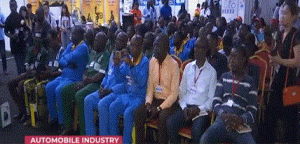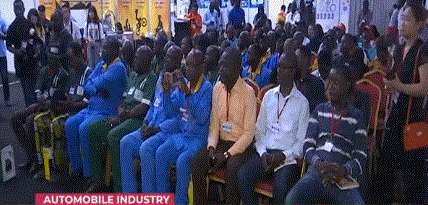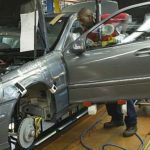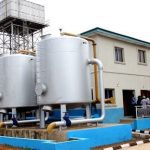
The Nigerian government has been advised to revisit the automotive policy to make it more competitive and attractive to business dealers.
Speaking at an automobile gathering in Lagos, industry players say this will open up the auto spare parts market and create jobs for the unemployed population.
Report shows that Nigeria spends more than 8 billion dollars annually importing used vehicles into the country, a development that experts say is not sustainable for economic growth and development of Africa’s most populous country.
They maintain that government needs to review the automotive policy to attract more investments.
According to them, if this is not effected, neighbouring countries will continue to benefit from import trade, a situation that will reduce government’s revenue generation drive.
Industry source has it that Nigeria’s auto spare parts market is worth over 4 billion dollars, with more than 13 million vehicles plying the national roads.
Industry players say the market remains an untapped goldmine.

The Nigerian government has been advised to revisit the automotive policy to make it more competitive and attractive to business dealers.
Speaking at an automobile gathering in Lagos, industry players say this will open up the auto spare parts market and create jobs for the unemployed population.
Report shows that Nigeria spends more than 8 billion dollars annually importing used vehicles into the country, a development that experts say is not sustainable for economic growth and development of Africa’s most populous country.
They maintain that government needs to review the automotive policy to attract more investments.
According to them, if this is not effected, neighbouring countries will continue to benefit from import trade, a situation that will reduce government’s revenue generation drive.
Industry source has it that Nigeria’s auto spare parts market is worth over 4 billion dollars, with more than 13 million vehicles plying the national roads.
Industry players say the market remains an untapped goldmine.

The Nigerian government has been advised to revisit the automotive policy to make it more competitive and attractive to business dealers.
Speaking at an automobile gathering in Lagos, industry players say this will open up the auto spare parts market and create jobs for the unemployed population.
Report shows that Nigeria spends more than 8 billion dollars annually importing used vehicles into the country, a development that experts say is not sustainable for economic growth and development of Africa’s most populous country.
They maintain that government needs to review the automotive policy to attract more investments.
According to them, if this is not effected, neighbouring countries will continue to benefit from import trade, a situation that will reduce government’s revenue generation drive.
Industry source has it that Nigeria’s auto spare parts market is worth over 4 billion dollars, with more than 13 million vehicles plying the national roads.
Industry players say the market remains an untapped goldmine.

The Nigerian government has been advised to revisit the automotive policy to make it more competitive and attractive to business dealers.
Speaking at an automobile gathering in Lagos, industry players say this will open up the auto spare parts market and create jobs for the unemployed population.
Report shows that Nigeria spends more than 8 billion dollars annually importing used vehicles into the country, a development that experts say is not sustainable for economic growth and development of Africa’s most populous country.
They maintain that government needs to review the automotive policy to attract more investments.
According to them, if this is not effected, neighbouring countries will continue to benefit from import trade, a situation that will reduce government’s revenue generation drive.
Industry source has it that Nigeria’s auto spare parts market is worth over 4 billion dollars, with more than 13 million vehicles plying the national roads.
Industry players say the market remains an untapped goldmine.

The Nigerian government has been advised to revisit the automotive policy to make it more competitive and attractive to business dealers.
Speaking at an automobile gathering in Lagos, industry players say this will open up the auto spare parts market and create jobs for the unemployed population.
Report shows that Nigeria spends more than 8 billion dollars annually importing used vehicles into the country, a development that experts say is not sustainable for economic growth and development of Africa’s most populous country.
They maintain that government needs to review the automotive policy to attract more investments.
According to them, if this is not effected, neighbouring countries will continue to benefit from import trade, a situation that will reduce government’s revenue generation drive.
Industry source has it that Nigeria’s auto spare parts market is worth over 4 billion dollars, with more than 13 million vehicles plying the national roads.
Industry players say the market remains an untapped goldmine.

The Nigerian government has been advised to revisit the automotive policy to make it more competitive and attractive to business dealers.
Speaking at an automobile gathering in Lagos, industry players say this will open up the auto spare parts market and create jobs for the unemployed population.
Report shows that Nigeria spends more than 8 billion dollars annually importing used vehicles into the country, a development that experts say is not sustainable for economic growth and development of Africa’s most populous country.
They maintain that government needs to review the automotive policy to attract more investments.
According to them, if this is not effected, neighbouring countries will continue to benefit from import trade, a situation that will reduce government’s revenue generation drive.
Industry source has it that Nigeria’s auto spare parts market is worth over 4 billion dollars, with more than 13 million vehicles plying the national roads.
Industry players say the market remains an untapped goldmine.

The Nigerian government has been advised to revisit the automotive policy to make it more competitive and attractive to business dealers.
Speaking at an automobile gathering in Lagos, industry players say this will open up the auto spare parts market and create jobs for the unemployed population.
Report shows that Nigeria spends more than 8 billion dollars annually importing used vehicles into the country, a development that experts say is not sustainable for economic growth and development of Africa’s most populous country.
They maintain that government needs to review the automotive policy to attract more investments.
According to them, if this is not effected, neighbouring countries will continue to benefit from import trade, a situation that will reduce government’s revenue generation drive.
Industry source has it that Nigeria’s auto spare parts market is worth over 4 billion dollars, with more than 13 million vehicles plying the national roads.
Industry players say the market remains an untapped goldmine.

The Nigerian government has been advised to revisit the automotive policy to make it more competitive and attractive to business dealers.
Speaking at an automobile gathering in Lagos, industry players say this will open up the auto spare parts market and create jobs for the unemployed population.
Report shows that Nigeria spends more than 8 billion dollars annually importing used vehicles into the country, a development that experts say is not sustainable for economic growth and development of Africa’s most populous country.
They maintain that government needs to review the automotive policy to attract more investments.
According to them, if this is not effected, neighbouring countries will continue to benefit from import trade, a situation that will reduce government’s revenue generation drive.
Industry source has it that Nigeria’s auto spare parts market is worth over 4 billion dollars, with more than 13 million vehicles plying the national roads.
Industry players say the market remains an untapped goldmine.














